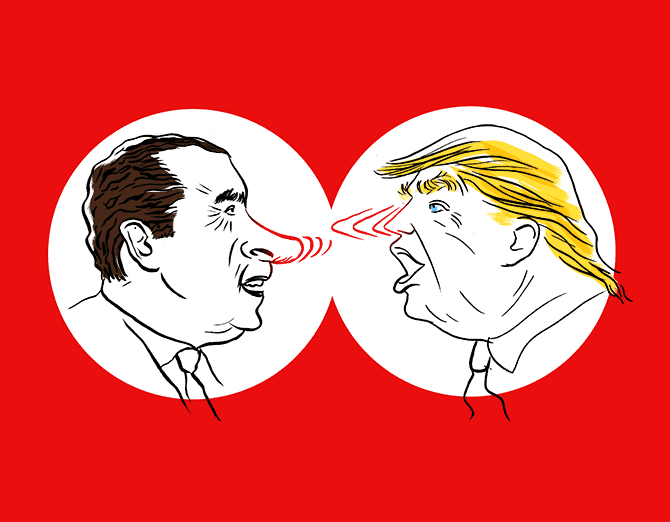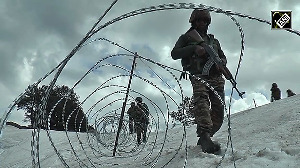'That the 'I' word is swirling around Washington these days attests to the atmosphere that has taken hold and cannot but have a negative impact on political and economic decision-making,' says Claude Smadja.
Illustration: Dominic Xavier/Rediff.com

It looks like an almost unstoppable fall into hell.
There has not been a single week which has not brought its harvest of embarrassments or more serious crises for President Donald Trump since his inauguration.
As the White House was still struggling to contain the damage created by the timing of -- and the contradictory explanations about -- the sacking of FBI Director James Comey, it got even more badly entangled in the turmoil created by the revelation that the president had revealed highly classified intelligence information to the Russian foreign minister.
As this was not enough to shake the whole US political establishment, the bombshell came that the president had asked Mr Comey in February that the FBI stop its investigation of the links between Michael Flynn, his very short-lived national security adviser, and Russia.
An allegation which -- if proved true -- could expose the president to the charge of obstruction of justice -- the same charge that led President Richard Nixon to resign in 1974 in the wake of the Watergate scandal to avoid being subjected to an impeachment process.
Quite obviously there would have to be many more developments to happen before the United States Congress could start impeachment proceedings; but the fact is that the Trump presidency is in such deep trouble that Democrats and even some members of the president's Republican party have started mentioning openly this eventuality.
This might never come to that. Only two presidents in US history have been impeached: Andrew Johnson in the 19th century and Bill Clinton in 1998, and neither of them was convicted and removed from office.
But the very fact that the 'I' word is swirling around Washington these days attests to the deleterious atmosphere that has taken hold and cannot but have a negative impact on many political and economic decision-making processes.
More trouble may be in store as special counsel -- former FBI director Robert Mueller -- has been appointed to look into the links between Trump campaign associates and Moscow.
This will increase the pressure on the president and his aides to provide a full account of their contacts with Russian officials and people linked to the Kremlin during the campaign and just after the election -- thus opening the possibility of new embarrassing or controversial revelations as it appears that there had been much more interaction than previously acknowledged.
Making matters worse is the psychology of Mr Trump, a man with high egomaniacal and narcissistic tendencies who would not admit to committing any mistake and would rather seek to obliterate realities with conspiratorial theories and would indulge in self-pity.
'No politician in history, and I say this with great surety, has been treated worse or more unfairly' did he observe in his commencement address to the US coast guard academy last month.
Given the huge, distracting impact of these developments, one can easily imagine the consequences of the present situation on the ability of the leader of the world's number one superpower to operate at home and abroad.
Domestically, there are growing doubts that Mr Trump will be able to deliver on his campaign promises of fast tax reductions, fiscal stimulus deregulation and huge infrastructure programme -- at least in the kind of time frame he had originally sketched out.
After the euphoria Mr Trump's election triggered in many business circles some disenchantment has now begun to seep in.
The S&P and the Dow Jones indices registered last month their biggest one-day fall over the last nine months, seemingly indicating that the US markets' irrational exuberance -- to use the terms coined by former Fed chairman Alan Greenspan 20 years ago -- following the outcome of the presidential election might now be coming to an end.
In fact, with the Democratic party fully aware of the vulnerability of the White House and the growing ambivalence of many ranking members of the Republican party towards their president, the passing of any significant piece of legislation in Congress has become more unlikely than ever.
It will take a lot of crisis management skills and the heights of compromise spirit between the White House and Congress to restore some hope of efficiency in Washington.
This is nowhere in sight for the moment.
One can assume that President Vladimir Putin of Russia and President Xi Jinping of China might derive some satisfaction from looking at the vulnerable situation in which their US counterpart has trapped himself in.
However, they are at the same time too astute players on the geopolitical chessboard not to realise that a cornered president, under pressure at home, might be even more unpredictable and tempted to create a diversion to its internal problem by stirring up international tensions through some kind of macho initiatives.
Having at the White House an embattled leader who has demonstrated so far a lot of amateurish impulsivity coupled with an oversized ego is not necessarily the best of situations.
So Mr Putin and Xi Jinping may wonder whether the US president's serious troubles might not in fact reduce the chances of addressing successfully some of the major issues clouding the relationship between Washington and their respective countries.
Claude Smadja is President, Smadja & Smadja, a strategic advisory firm.












 © 2025
© 2025